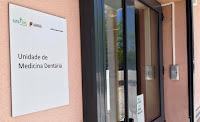The big problem is that
we have a very high value of teeth lost due to caries, surely because
people look for the dentist very late, says the coordinator of the Oral
Health Program of the Directorate-General for Health. Only 3% of adults
in Portugal Dental caries problems, with the situation
worsening in the elderly, who still have on average 11 teeth totally
lost, according to an official study.
The third National Study of Prevalence of Oral Diseases was conducted in five age groups representative of the Portuguese regional and national population, according to criteria recommended by the World Health Organization (WHO). For the first time, age groups of the adult population were included in the National Prevalence Study of Oral Diseases, with the children, previously studied, showing "significant improvements" in their dental health.
The third National Study of Prevalence of Oral Diseases was conducted in five age groups representative of the Portuguese regional and national population, according to criteria recommended by the World Health Organization (WHO). For the first time, age groups of the adult population were included in the National Prevalence Study of Oral Diseases, with the children, previously studied, showing "significant improvements" in their dental health.
The group of 35-44 years is the great surprise of the national study. Virtually all people have had contacts with caries. Only 3% of adults in Portugal never had caries problems. From
a certain age, we can expect that all Portuguese have or have had
problems related to dental health, said Rui Calado, coordinator of the
Oral Health Program of the Directorate General of Health. The
study identified an average of 10.3 teeth with problems per person, but
concluded that almost five of those teeth are already treated, and four
are missing teeth.
The big problem is to have a very high value of teeth lost due to caries, surely because people look for the dentist very late. But
access to dental medicine exists and was verified, because of the 10.3
with problems, only 1.5 are to be treated, explained Rui Calado. In fact, the levels of membership, access, are news for us. We were expecting worse access levels. What happens is that people have access but they look for the dentists very late, he added.In
the group of the elderly, between 65 and 74 years, there are an average
of 15 diseased teeth per person, 11.5 of which are already totally lost
teeth, in which the only alternative is rehabilitation through
prostheses. The only solution is rehabilitation. The
form has to be thought and studied because any account, however slight,
indicates that we are talking about astronomical values, if we want to
make a public intervention, said the coordinator of the Oral Health
Promotion Program.
With
regard to children, the DGS says that health gains have been made clear
by the development of the Program (which provides dental checks, among
other interventions), with more than half of children aged six and 12
being totally free Of cavities and with all healthy teeth. The average number of teeth with problems is 1.6 in six - year - old
children and 1.2 in children of 12, which are halved compared to what
was found in the 2000 study.We
have an excellent dental health situation in children up to 12 years of
age, said Rui Calado, considering that the application of sealants
promoted by the Oral Health Program has been working, as well as
treatments performed through dental checks. The
National Oral Health Program, which has been developed in partnership
with the Ordem dos Médicos Dentistas, promotes the application of
fissure sealants in healthy permanent molars in children and allows
other treatments through dental checks provided at 7, 10, 13 and 15 years.








